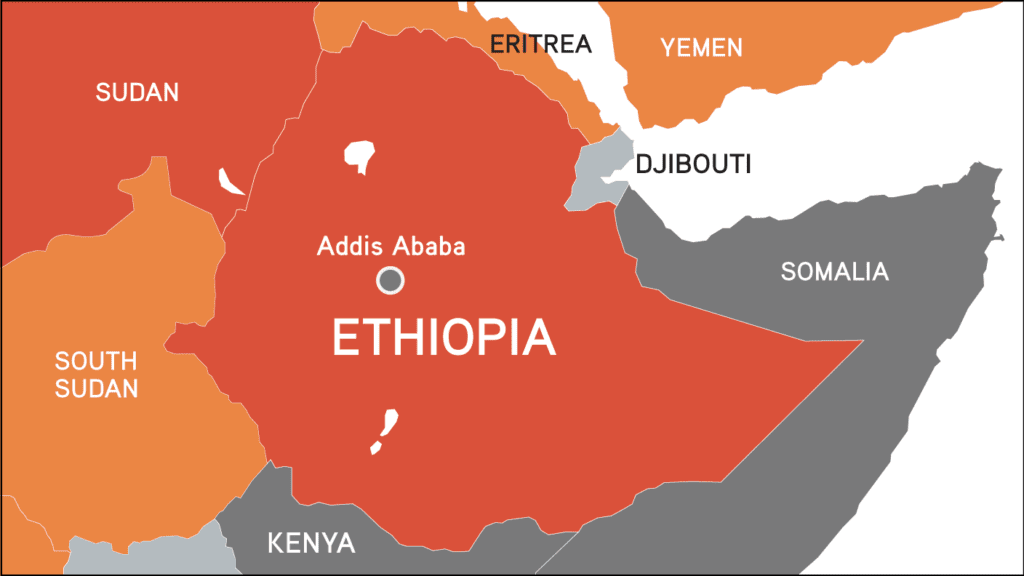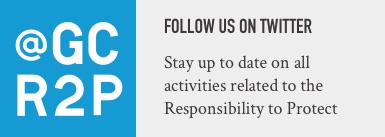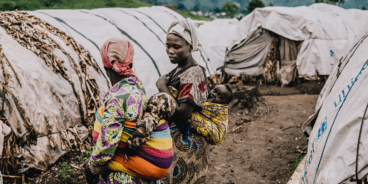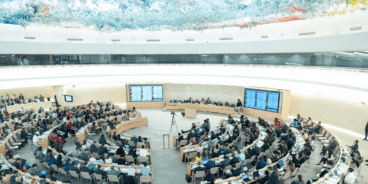
Ethiopia
Despite a peace agreement, populations in the Tigray region of Ethiopia continue to endure war crimes and crimes against humanity. Populations throughout the country also continue to be at risk due to inter-communal violence and clashes with government forces.
BACKGROUND:
From November 2020 – November 2022 the Ethiopian National Defense Forces (ENDF) and its allies, including the Eritrean Defense Forces (EDF), fought in an armed conflict with the Tigray Defense Forces (TDF) in northern Ethiopia. The fighting began in the Tigray region and subsequently spread to neighboring Afar and Amhara regions in July 2021. The conflict caused a humanitarian catastrophe to unfold across northern Ethiopia, killing hundreds of thousands of people and leaving over 1 million internally displaced. On 2 November 2022 the federal government of Ethiopia and the regional governing Tigray People’s Liberation Front (TPLF) agreed to a cessation of hostilities agreement (CoHA), brokered by the African Union, aimed at ending the conflict.
Possible war crimes and crimes against humanity were committed by all parties to the conflict. Several UN bodies, including the International Commission of Human Rights Experts on Ethiopia (ICHREE), and international human rights groups documented indiscriminate bombings, ethnic-based killings, sexual violence, forced displacement, use of child soldiers, destruction of cultural heritage and systematic destruction of food, water and health infrastructure. Amnesty International and Human Rights Watch found that Amhara regional forces and militias and the EDF, with ENDF complicity, were responsible for the ethnic cleansing of Tigrayans from Western Tigray.
Despite the CoHA, abuses by the EDF and regional Amhara forces have continued in Tigray, including looting of civilian property, as well as kidnappings and mass detentions, while the ICHREE and international human rights groups have documented potential war crimes and crimes against humanity, including sexual violence and extrajudicial killings of civilians. Despite multiple warnings from the ICHREE of an imminent risk of atrocity crimes, UN member states failed to put forward a resolution to renew the Commission’s mandate at the UN Human Rights Council’s 54th session, ending international monitoring of the crises.
The Office of the UN High Commissioner for Human Rights and the Ethiopian Human Rights Commission (EHRC) released a report in December 2023 based on community consultations, encouraging the federal government to implement multiple tracks of transitional justice, including criminal accountability, truth-seeking, reparations and guarantees of non-recurrence.
In April 2023 the government announced plans to integrate regional militia forces into the federal army and police, prompting fears among populations regarding loss of regional autonomy and vulnerability to attacks by other ethnic groups. Protests against the measure escalated in Amhara, leading to intense clashes between the fano, an irregular ethnic Amhara militia, and the ENDF. The EHRC has documented the targeting of civilians and civilian property during the clashes. The UN has warned of ongoing abuses, including arbitrary arrests and drone strikes targeting civilian areas. The ENDF have also been accused of killing civilians while searching for fano supporters.
Inter-communal and inter-religious violence, particularly between the Amhara and Oromo communities, as well as regional border disputes in other parts of Ethiopia continue. Oromia regional security forces, the ENDF and Oromo Liberation Army (OLA) armed group have committed enforced disappearances and attacks on civilians, including ethnic Amharas. The ENDF have launched repeated air and drone strikes in Oromia and extrajudicially executed civilians perceived to be supportive of armed groups.
RECENT DEVELOPMENTS:
From 14-15 February clashes were reported in Amhara-controlled areas of the Southern Tigray zone for the first time since the CoHA. Fighting between ethnic armed groups, as well as with the ENDF, also continued in the Amhara region. From 18-21 March ethnic Amhara and Oromo militias clashed, killing at least 27 people. Fighting between Amhara militias and the ENDF persists, mainly around West Gojam zone. On 5 February the ENDF conducted house-to-house searches in Merawi and executed at least 50 civilians, including a 6-year-old child, in retaliation for intense clashes with fano militia.
In Oromia the ENDF killed at least 16 Amharas during search operations between 15-16 March. Clashes between the ENDF and OLA also escalated throughout March, particularly in West Guji zone.
In the Gambella region, at least 138 people have been killed in inter-communal violence since May 2023, according to the EHRC. This includes violence perpetrated by and against South Sudanese refugees living in shelters across the region.
On 1 March the European Union pledged 16 million Euro to support the disarmament, demobilization and reintegration of at least 370,000 ex-combatants in eight regions across Ethiopia.
On 17 April 2024 Ethiopia’s Council of Ministers approved the long-awaited draft Transitional Justice Policy.
ANALYSIS:
Populations in Tigray, Afar and Amhara remain at risk of further war crimes and crimes against humanity due to repeated violations of the CoHA. The unresolved question of the administration of Western Tigray and other disputed territories could reignite conflict, with both Amhara and Tigrayan ethnic groups claiming control over the land. Rising tensions between the interim Tigray authorities and the federal government have the potential to spark a wider conflict.
Civilians in Tigray also remain at risk due to the continued presence of the EDF, which have repeatedly been accused of atrocity crimes while Eritrean authorities have allegedly sought to settle decades-old grievances with the TPLF through the collective punishment of Tigrayans,
In the Amhara and Oromia regions, civilians remain at heightened risk of atrocities due to fighting between ethnic militias and the ENDF’s retaliation on local communities. Amharas in Oromia are also particularly vulnerable to attacks by the OLA. The targeting of civilians based on their identity may amount to crimes against humanity.
The non-renewal of the ICHREE incentivizes the federal government to further entrench impunity and undermines victim’s hopes for justice.
Ethiopia’s ethnic-based federalist system has resulted in widespread allegations of ethnic favoritism, deepening distrust between ethnic groups. Under the former TPLF-dominated ruling coalition, which controlled the government for 27 years prior to Prime Minister Abiy Ahmed coming to power in 2018, many groups were marginalized. A history of impunity and lack of effective transitional justice for human rights abuses perpetrated under successive ruling parties has exacerbated these grievances. The conflict in northern Ethiopia sparked an increase in hate speech between ethnic groups and has caused other pre-existing ethnic tensions to flare.
RISK ASSESSMENT:
-
- Ongoing and unresolved tensions following the conflict, threatening the fragile peace process.
- Policy or practice of impunity for – or tolerance of – serious violations of international humanitarian and human rights law, atrocity crimes or their incitement.
- Unresolved inter-communal tensions and the ENDF’s attacks on associated ethnic-based militias – many of whom are fighting for autonomy of their group.
- Inflammatory rhetoric, propaganda campaigns or hate speech by political figures to capitalize on the politicization of ethnic identity.
- Lack of trust and confidence in state institutions to resolve conflicts and implement transitional justice initiatives.
NECESSARY ACTION:
While meaningful steps to implement the CoHA and enable the unfettered delivery of aid have been taken, the process must continue in good faith. The EDF should immediately withdraw from Ethiopia. The UN Security Council should impose an arms embargo and sanctions on spoilers to the peace process.
Due to the lack of confidence in domestic accountability measures, the international community should explore alternative options, including through universal jurisdiction. The federal government should work with UN Special Procedures and experts on transitional justice to ensure processes meet international standards.
The government must refrain from violations of international law while conducting military operations and spare no effort to protect civilians. Armed groups must also end the targeting of civilians.
The international community must maintain scrutiny of the crises in Ethiopia. Any normalization should be contingent on progress made toward respecting human rights and assurances of inclusive, transparent and good faith accountability efforts.



